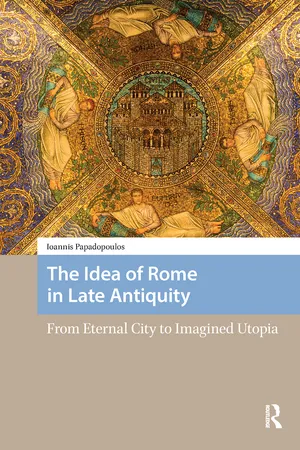
The Idea of Rome in Late Antiquity
From Eternal City to Imagined Utopia
- English
- ePUB (mobile friendly)
- Available on iOS & Android
About this book
This book approaches the manifestation and evolution of the idea of Rome as an expression of Roman patriotism and as an (urban) archetype of utopia in late Roman thought in a period extending from AD 357 to 417. Within this period of about a human lifetime, the concepts of Rome and Romanitas were reshaped and used for various ideological causes. This monograph unfolds through a selection of sources that represent the patterns and diversity of this ideological process. The theme of Rome as a personified and anthropomorphic figure and as an epitomized notion 'applied' on the urban landscape would become part of the identity of the Romans of Rome highlighting a sense of cultural uniqueness in an era when their city's privileged status was challenged. Towards the end of the chronological limits set in this thesis various versions of Romanitas would emerge indicating new physical and spiritual potentials.
Frequently asked questions
- Essential is ideal for learners and professionals who enjoy exploring a wide range of subjects. Access the Essential Library with 800,000+ trusted titles and best-sellers across business, personal growth, and the humanities. Includes unlimited reading time and Standard Read Aloud voice.
- Complete: Perfect for advanced learners and researchers needing full, unrestricted access. Unlock 1.4M+ books across hundreds of subjects, including academic and specialized titles. The Complete Plan also includes advanced features like Premium Read Aloud and Research Assistant.
Please note we cannot support devices running on iOS 13 and Android 7 or earlier. Learn more about using the app.
Information
Table of contents
- Cover Page
- Half Title page
- Title Page
- Copyright Page
- Dedication
- Contents
- Introduction: Between a Physical and an Imaginary City
- I Looking Backwards: Ordo Renascendi
- II The Adventus of Constantius
- III Between Rome and Athens: The Artificial Romanitas of Julian
- IV Between the Altar and the Court: Symmachus and Claudian in Action
- V Between Christ and a Roman Place: The Emergence of Christian Rome in Time and Space
- VI Between Jerusalem and Babylon: The Archetype of Rome in the City of God
- Conclusions: From Rome to Eternity
- Bibliography
- Index